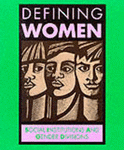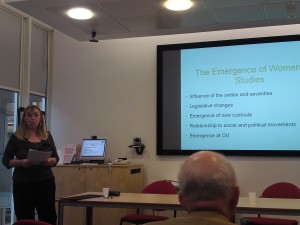Open to ideas
 The second main session of Opening Up The Open University again offered a diverse range of persepectives on some of the ideas that have contributed to the OU’s history.
The second main session of Opening Up The Open University again offered a diverse range of persepectives on some of the ideas that have contributed to the OU’s history.
The first speaker was Professor Dave Harris from UCP Marjon who considered the OU’s impact on the HE sector. He explained the radical appeal of the OU and drew attention to the view of Brian Lewis, one of the first IET professors, that ‘irrelevant scholastic displays must be eliminated’ (1971). Prof Harris credited the OU with breaking down academic language into more simple, logical forms of communication, and highlighted the influence of individuals who moved on from the OU in introducing ‘managerialism’ to the rest of the sector.
 Secondly, Ms Liz Whitelegg, Senior Lecturer in the Faculty of Science, spoke to a paper written with Dr Gill Kirkup, Senior Lecturer in IET, on ‘The challenge of OU Gender Studies (1980 – 1999)’. The paper gives an insight into the challenge of cross faculty, cross cultural, issue-based programmes and their reflection of broader developments in society. The two main courses in Women’s Studies had around 9,000 students, and influenced other programmes and research, as well as drawing in over 100 Associate Lecturers. Ms Whitelegg pointed out that the paper was only able to explore the legacy of Women’s Studies inside the OU, and that the impact on other institutions and the lives of students was still to be explored.
Secondly, Ms Liz Whitelegg, Senior Lecturer in the Faculty of Science, spoke to a paper written with Dr Gill Kirkup, Senior Lecturer in IET, on ‘The challenge of OU Gender Studies (1980 – 1999)’. The paper gives an insight into the challenge of cross faculty, cross cultural, issue-based programmes and their reflection of broader developments in society. The two main courses in Women’s Studies had around 9,000 students, and influenced other programmes and research, as well as drawing in over 100 Associate Lecturers. Ms Whitelegg pointed out that the paper was only able to explore the legacy of Women’s Studies inside the OU, and that the impact on other institutions and the lives of students was still to be explored.
Great thanks were expressed to Gill Kirkup who as well as submitting her own paper with Liz Whitelegg also agreed to speak to a paper submitted by Professor of Educational Technology Mary Thorpe, who was out of the country. How have pedagogic techniques and tools evolved within the University? explores a number of issues. It is suggested that the social side of learning is possibly increasing, with asynchronous conferencing adding to social interaction. The rethinking of OU teaching leads to a seamless combination of individual and group activities on the web. Prof Thorpe concludes by emphasising the importance of retaining course team working, for quality and innovation; of shared discourse about teaching across all regions and units; and of listening to the student voice.
Again discussion was wide-ranging, with possibly the key point being made by those who had worked in universities outside of the OU about its impact on the sector as a whole. This is an area that is hard to measure and the project particularly welcomes feedback on this topic. It was also pointed out that there is no current equivalent of the resource area for seeding curriculum innovation, the 1980s ‘U’ Area Subcommittee, which had the power to consider novel cross-faculty programmes and to allocate resource.
Efforts were made to ensure advances in the OU were seen as part of the overall picture of higher education, and society more broadly; and that the workshop was looking at the OU in an historical framework rather than attempting to offer solutions to current and past issues.